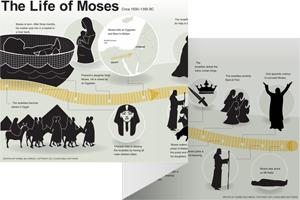8:1–15 Yahweh’s second plague against Egypt brings frogs (vv. 1–6). As before, the Egyptian magicians replicate the plague (v. 7). This time, however, Pharaoh pleads with Moses and Aaron to take it away (v. 8). When the plague ends, he hardens his own heart (vv. 9–15; see note on 4:21). |
8:2 frogs The influx of frogs would have been the natural result of a polluted Nile. See note on 7:17.
would have been the natural result of a polluted Nile. See note on 7:17.
 Ten Plagues on Egypt Table
Ten Plagues on Egypt Table
8:7 the magicians did likewise Rather than solve the problem, the Egyptians again worsen the conditions (see 7:22).
8:8 Pray to Yahweh Pharaoh has no confidence in the magicians’ ability to stop the plague, despite their ability to imitate it. His request suggests that he knows that Yahweh is behind all that has befallen Egypt.
they can sacrifice to Yahweh Pharaoh accedes to Moses’ initial request (see 5:3; 7:16).
8:9 I leave to you the honor over me Moses’ boldness and confidence in Yahweh’s power has grown. Not only will he pray to Yahweh for the plague to stop—he also tells Pharaoh that he can specify when it will cease.
8:10 Tomorrow It is not clear why Pharaoh asks Moses to pray the following day rather than immediately. Pharaoh may assume that Moses must first perform some sort of preparation or sacrifice to ensure a positive answer.
like Yahweh our God While the plagues ultimately succeed at forcing Pharaoh to set the Israelites free, the supremacy of Yahweh over Egypt’s gods (including Pharaoh, considered the incarnation of Horus by his fellow Egyptians) is paramount.
8:11 only in the Nile The frogs will return to the Nile, their proper habitation.
8:12 that he had brought Moses asks God to halt the plague the next day.
8:15 he made his heart insensitive Refers to selfish stubbornness born of arrogance. See note on 4:21.
8:16–19 In the third plague, small insects overrun Egypt. While the insects may have been gnats, they may also have been lice or mosquitoes (compare note on v. 17). |
8:17 the dust of the land Neither gnats nor mosquitoes come from the dust of the ground, but lice may have been associated with the ground since they crawl. The language here conveys a supernatural act.
8:18 they were not able Again, the Egyptian magicians seek to imitate the plague, but this time they do not succeed. The insects’ dissociation from a natural source (v. 17) apparently contributes to this failure.
8:19 the finger of God The Hebrew term for “God” here is elohim, allowing for the alternate translation, “the finger of a god.”
Yahweh had spoken See 3:19–20.
8:20–32 During the fourth plague, the plague of flies, Yahweh calls attention to the different way it will affect Israelites and Egyptians for the first time (vv. 22–24; compare 9:4, 26; 10:23). |
8:21 flies The Hebrew word used here, arov, is ambiguous. Since it literally means mixture, it is often interpreted as a swarm of insects such as flies. However, this meaning is uncertain.
8:22 Goshen See Gen 45:10; 46:28–29.
the midst of the land In the heart of this land (Egypt). Yahweh—not Pharaoh or any Egyptian god—is lord of Egypt.
8:25 sacrifice to your God in the land Pharaoh seeks a compromise. He will allow the Israelites to worship Yahweh within Egypt.
8:26 we sacrifice before their eyes the thing detestable to the Egyptians The Hebrew word used here, to'evah (meaning “abomination”), is also used in Gen 43:32 and 46:34 to describe the Egyptians’ revulsion at dining with Hebrews, as well as their distaste for shepherds. The nature of the Egyptians’ revulsion towards the Israelites’ sacrifice is unknown. Egyptian literature and art demonstrate that the Egyptians did not object to the sacrifice of cattle. Pharaoh does not argue with Moses’ concern, suggesting that he knows it to be true.
8:28 surely you must not go far Pharaoh again seeks a compromise. He will allow the Israelites to go into the wilderness, but not far from Egypt. He also requests that Moses pray to Yahweh to halt the plague.
8:29 let not Pharaoh again deceive Moses warns Pharaoh to keep his pledge; Pharaoh must not be deceptive, unlike before (Exod 8:15).
8:32 made his heart insensitive See note on 4:21. By now, Pharaoh’s retraction of his promise comes as no surprise to Moses.

|
About Faithlife Study BibleFaithlife Study Bible (FSB) is your guide to the ancient world of the Old and New Testaments, with study notes and articles that draw from a wide range of academic research. FSB helps you learn how to think about interpretation methods and issues so that you can gain a deeper understanding of the text. |
| Copyright |
Copyright 2012 Logos Bible Software. |
| Support Info | fsb |
 Loading…
Loading…

